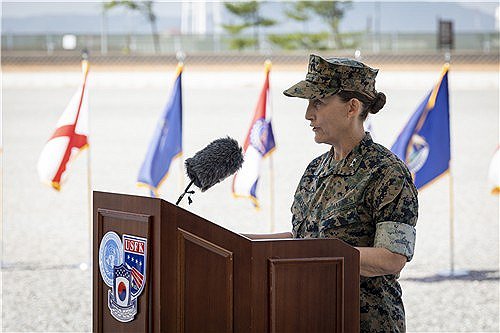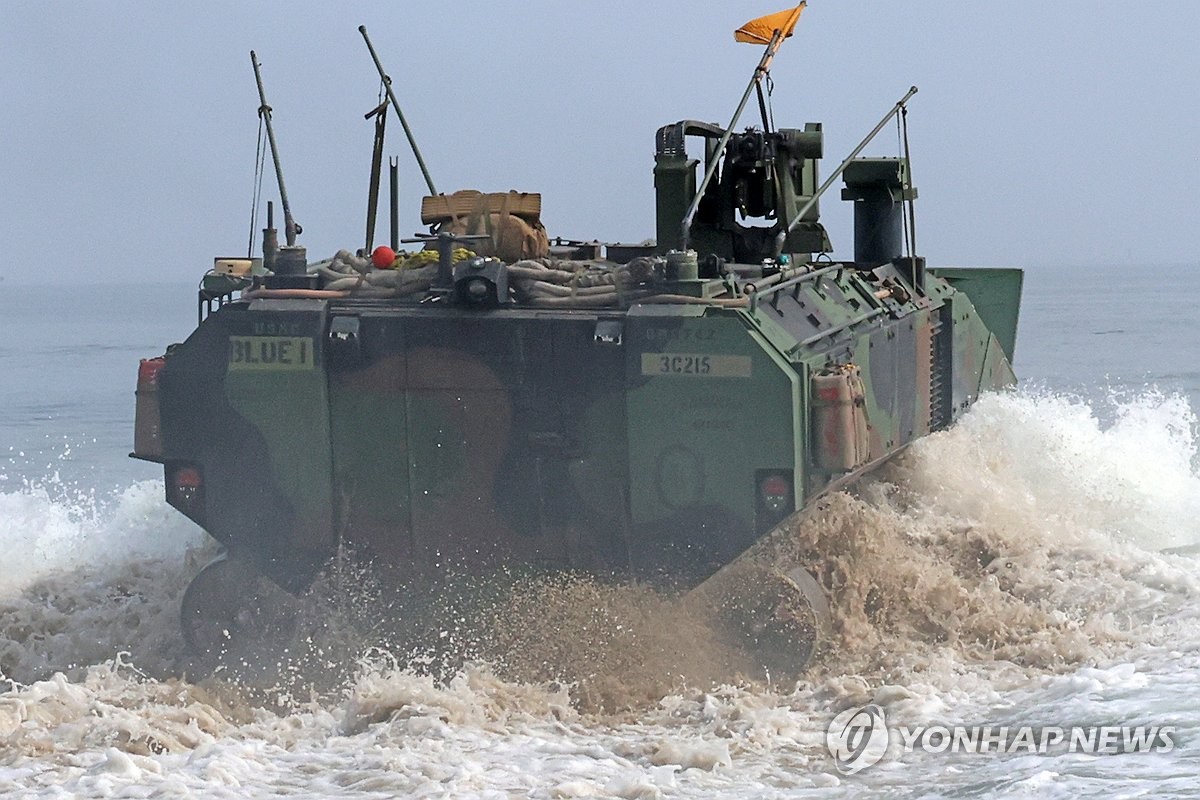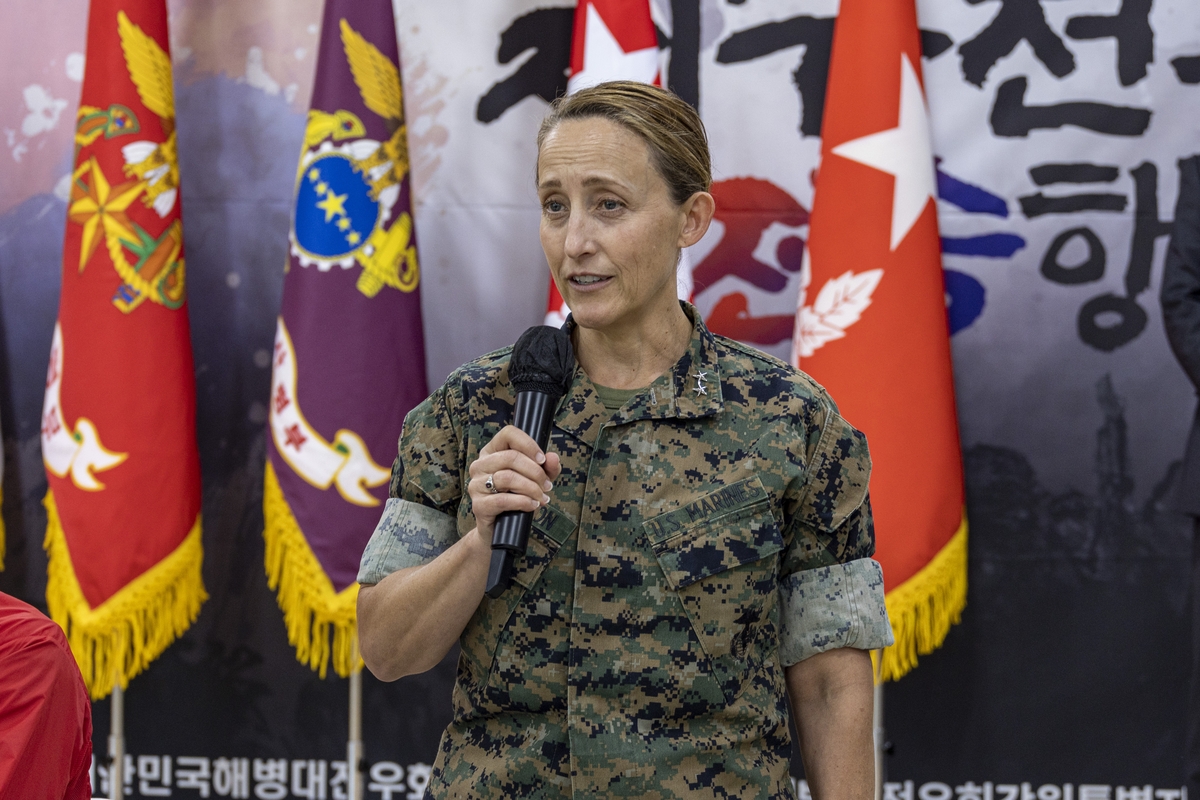U.S. Marine Leader in S. Korea Highlights "Time-Tested" Alliance 75 Years After Korean War
(Korean War) US Marine commander
SEOUL, June 22 (Yonhap) -- The top U.S. Marine commander in South Korea has underscored her troops' commitment to the "time-tested" alliance between the two nations and readiness to support regional stability, as the allies face new security challenges 75 years after the 1950-53 Korean War.
Maj. Gen. Valerie Jackson, head of the U.S. Marine Corps Forces Korea (MARFORK), highlighted the allies' ties tracing back to the three-year conflict, which broke out with North Korea's invasion of South Korea on June 25, 1950, in a written interview with Yonhap News Agency on Wednesday.
"For the past 75 years, the U.S. Marine Corps has demonstrated its commitment to the time-tested bond that was created 75 years ago when the ROK, U.S. and international service members fought shoulder to shoulder," Jackson said. ROK is short for South Korea's official name -- the Republic of Korea.

U.S. Marines played a key role during the Korean War, taking part in the amphibious landing of Incheon in September 1950 that led to a decisive victory for South Korea and U.S.-led U.N. troops.
Jackson, who took office earlier this month, oversees a force of about 100 personnel and facilitates regular training for U.S. Marines who are deployed from outside the country, including Japan.
South Korean and U.S. Marines stage large-scale amphibious landing exercises, among other drills, throughout the year to maintain readiness against North Korean threats.
"U.S. Marine Corps Forces Korea remains dedicated to our mission and ready to support the broader Indo-Pacific strategy," she said. "Our combined, joint, all-domain training footprint ensures readiness on the Korean Peninsula and provides flexibility to respond to regional operations."
Jackson said her troops are ready to support "regional stability," highlighting their role in the broader region.
"Since its establishment 30 years ago, MARFORK has adapted to become an important enabler of joint and combined exercises involving U.S. Marines," she said. "While our mission remains unchanged, we are ready to respond to any contingency and support regional stability."
As the allies mark the war's 75th anniversary this week, they face new tests over North Korea's evolving nuclear and missile threats and Washington's efforts to prioritize defense capabilities in the region to deal with an intensifying rivalry with Beijing.
U.S. Forces Korea Commander Gen. Xavier Brunson has recently described South Korea as a "fixed-aircraft carrier" in a region facing multiple security challenges, highlighting the strategic value of his 28,500-strong force in overcoming geographic constraints for regional operations.

Regarding possible adjustments to allied Marine drills if U.S. troops are needed elsewhere, Jackson said the decision would be made by consulting with South Korea.
"The number of personnel assigned to U.S. Marine Corps Forces Korea is scaled to meet mission requirements throughout the year," Jackson said. "Any future adjustments in scale would be made in close coordination with our allies and based on evolving strategic priorities across the region."
Jackson described her unit as a "learning" force, calling the recent introduction of drone capabilities into allied exercises, such as last year's Ssang Yong, or "twin dragon," exercise, as a sign of commitment to modernizing their forces.
As South Korea and the United States have recently pushed to develop the alliance born from the ashes of the Korean War, they have deepened trilateral security cooperation with Japan through joint fighter jet and warship drills.
When asked about the need to incorporate amphibious forces into such exercises, Jackson said the move would require agreement from all sides.
"Trilateral training across all domains plays a critical role in enhancing combined, joint and all-domain deterrence," she said. "Future amphibious collaboration would need to be mutually agreed upon by our allies and conducted in alignment with shared strategic priorities."
The Korean War ended in a truce, not a peace treaty, leaving the two Koreas technically still at war. Nearly 180,000 South Korean and U.N. Command troops were killed during the war, including 36,940 Americans.

yunhwanchae@yna.co.kr
(END)
Copyright (c) Yonhap News Agency prohibits its content from being redistributed or reprinted without consent, and forbids the content from being learned and used by artificial intelligence systems.
Post a Comment for "U.S. Marine Leader in S. Korea Highlights "Time-Tested" Alliance 75 Years After Korean War"
Post a Comment